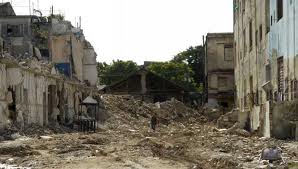
Soon, a new population and housing census will take place that shall show how many of us there are and the current living situation in our country.
Among the many and ever more acute problems, that of housing is one of the most difficult given all that it implies for the family and individuals. Extended cohabitation among different generations, many times with a great deal of overcrowding, leads sometimes to the loss of values, dehumanization and domestic violence.
The cases of close family members — in a pitched battle for a place to live — turn out to be dramatic and many times embarrassing.
For some time now the inns where rooms were rented to couples by the hour — welcome in a country where multi-generational families cram into small apartments — have been converted to shelters for victims of hurricanes, fires, building collapses and so on. Today these true citadels crammed with people in precarious conditions.
Like many things in today’s Cuba, this problem remains static, without any sign of a plan or on the part of the State which, for many years, did not permit the repair of homes or the construction of new ones through the sale of building materials to the inhabitants; now it appears there is no answer to this problem created by State itself over long long years.
Thus, the death of the owner of a home, often creates a whole conflict between those who consider they have a legal right to the housing for one reason or another, because they know: either they make it theirs or they will have to stay put… where no one wants to go or stay.
Another problem with this harrowing case is that of forced evictions … sorry, I meant to say “removals”.
When a house is abandoned by its inhabitants for any reason whatsoever, and sealed by the State, is not uncommon for the seal to be broken and be occupied by people who literally live on the street.
In other cases, there is no housing and people are forced into squats or one-room tenements, or they may “fabricate” (if this can even be called a fabrication) something that brings to mind a room but is made from cardboard, palm fronds, pieces of zink or whatever things that can find… and show up with wives… and children… sometimes babies.
In many of these opportunities, they end up forcibly evicted … sorry, (in Cuba there are no evictions), again, I meant to say the “extraction” which is performed by the security forces, responding to a different conception of “due obedience “.
And if the UN says in its document, The Practice of Forced Evictions, of June 1997…
Forced evictions constitute prima facie violations of a wide range of internationally recognized human rights and can only be carried out under exceptional circumstances and in full accordance with the present Guidelines and relevant provisions of international human rights law.
…it says what is wants to say because it doesn’t have anything to do with us since here there are no evictions… there are extractions.
Translated by: Michelle Eddy
July 13 2012
